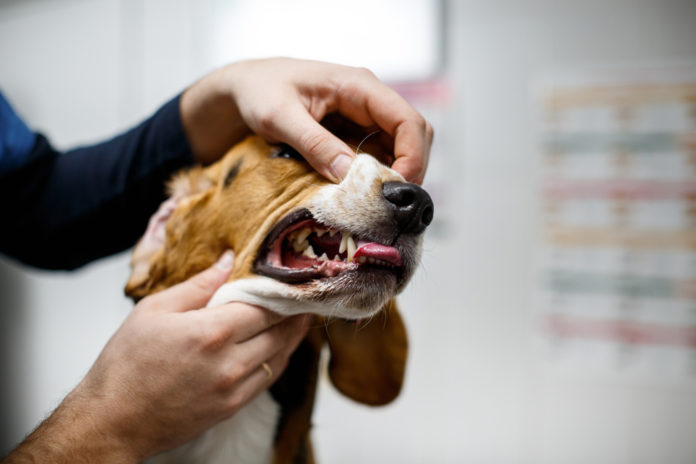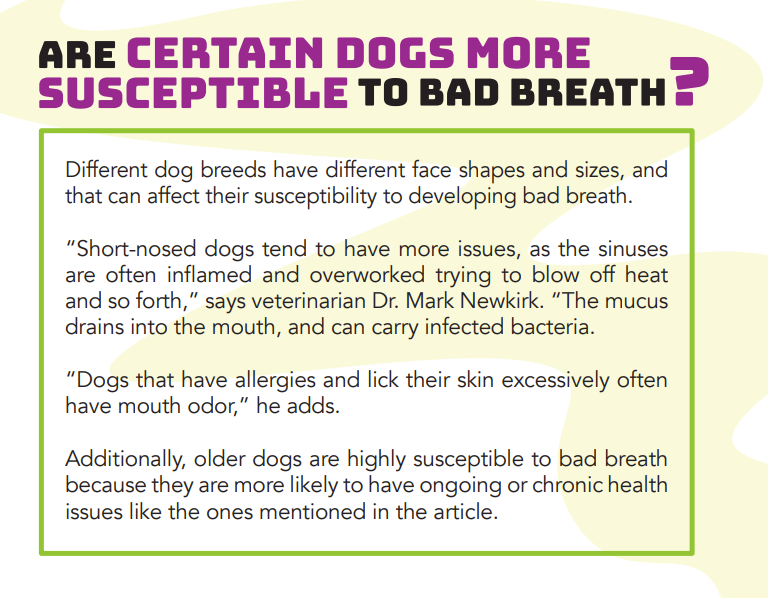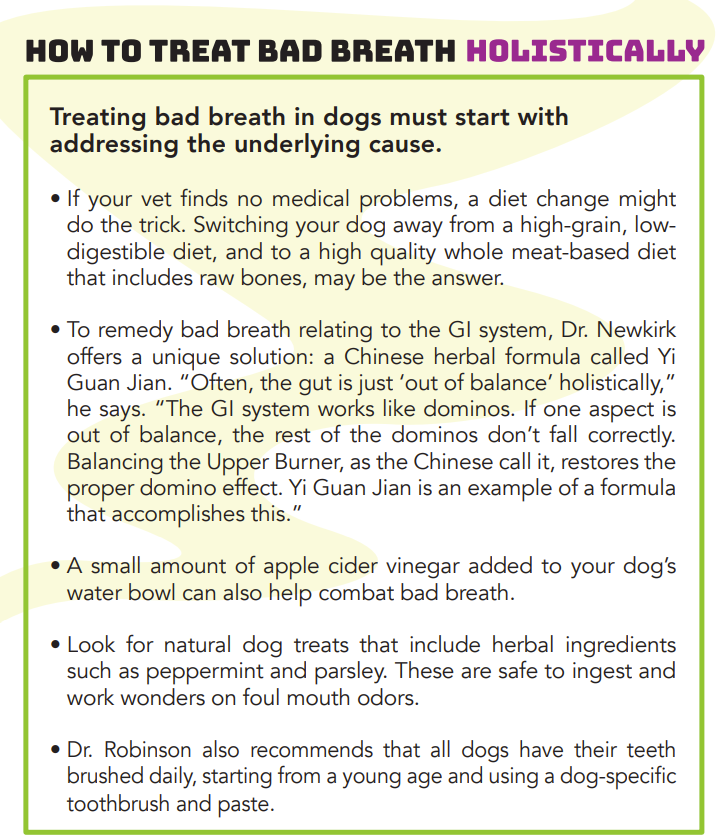When bad breath in dogs is more than a dental problem

Most bad breath in dogs is caused by periodontal disease – but that’s not always the case. Here’s a look at the other causes, along with some holistic remedies for chronic bad breath.
Let’s face it, dog breath is not always pleasant. While bad odors are often caused by periodontal disease, that’s not the only potential reason for stinky breath. Other causes range from diet to kidney disease to tumors, so it’s important to notice any changes in your dog’s breath, and have him or her checked over by a veterinarian as soon as possible.
What can cause it?
Most dog parents think that bad breath correlates to a dental issue such as gingivitis, which is caused by the growth of plaque from germs and food fragments caught in the dog’s mouth and teeth. This is certainly a very common problem among canines, and definitely warrants veterinary attention. However, don’t just assume that your dog’s breath odor is coming from a dirty mouth.
Diet
 According to veterinarian Dr. Laura Robinson, diet is one of the biggest factors when it comes to foul-smelling breath in dogs. Poor quality food is more likely to lead not just to periodontal disease, but also to bad breath on its own. For example, a food containing fish-based meals can cause a strong mouth odor. Also, if a dog eats something his body is not familiar with, or has a hard time digesting, bad breath can result. More obvious causes of bad breath is when the dog ingests something he is not supposed to eat such as feces or garbage – luckily, that kind of bad breath is only temporary!
According to veterinarian Dr. Laura Robinson, diet is one of the biggest factors when it comes to foul-smelling breath in dogs. Poor quality food is more likely to lead not just to periodontal disease, but also to bad breath on its own. For example, a food containing fish-based meals can cause a strong mouth odor. Also, if a dog eats something his body is not familiar with, or has a hard time digesting, bad breath can result. More obvious causes of bad breath is when the dog ingests something he is not supposed to eat such as feces or garbage – luckily, that kind of bad breath is only temporary!
Anal gland disease
Dr. Robinson adds that other not-so-obvious factors could be responsible for the foul odor coming out of your dog’s mouth. One of these is anal gland disease. “While it may seem absurd that a condition affecting a dog’s bottom end can influence his breath, it is indeed the case,” she says. “Those with impacted or infected anal glands will often lick the area in an attempt to get relief from the discomfort. This will inevitably lead to some bad-smelling breath.”
Diabetes
If the scent wafting out of your dog’s mouth is overly sweet, it can be a sign of diabetic ketoacidosis, a life-threatening complication of diabetes mellitus. It can be triggered by a stress event such as an infection, surgery, or heart problem. It occurs when the body begins breaking down fat at a rate that’s too rapid for the rest of the body to keep up with. This triggers the liver to process the fat into a form of fuel called ketones. This results in the blood becoming acidic. Needless to say, if you notice your dog’s breath is smelling very sweet, get him to the vet promptly.
Kidney disease
If the bad breath is chronic, even when any dental disease has been addressed, other serious issues such as kidney disease should be considered. “Kidney disease can lead to ‘uraemia’ or a build-up of toxins,” says Dr. Robinson. “This may lead to oral ulcers as well as halitosis and drooling. Other signs to watch for would include a reduced appetite, increased thirst, and weight loss.”

Oral or nasal tumor
Like oral ulcers, an oral or nasal tumor can affect a dog’s breath. It’s important to note that these masses may not be visible; to get a better look, a veterinarian will often need to insert a small camera into the nostril to check for a growth.
Infection
Another common cause of bad breath, according to Dr. Robinson, is an infection caused by a foreign body in the nose or the back of the throat. “In the summer, grass blades are notorious for causing this issue,” she says.
While dental problems are often the source of bad breath in dogs, it’s important not to make that assumption without a veterinary examination. Once you’ve uncovered the root cause of your dog’s stinky breath, and are addressing the problem with your vet’s help, you can take some simple holistic steps (see sidebar above) to help nix the odor.



